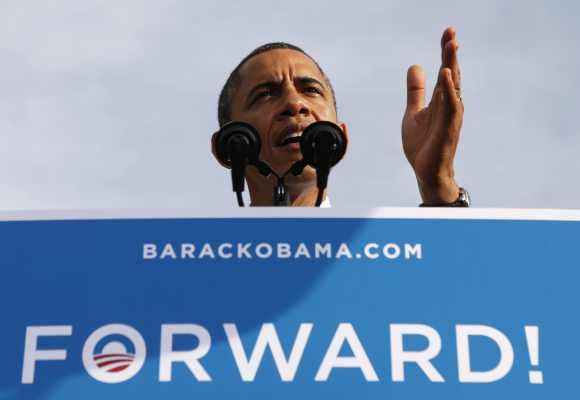 | « Back to article | Print this article |
US prez polls: Unpredictable Florida could swing either way
Though many exit polls suggest that Mitt Romney has a slight edge over Barack Obama in Florida they are anything but conclusive. Bikash Mohapatra reports from Tampa
As Florida goes, so goes the nation
Though the original phrase doesn't mention Florida (it is Maine), the southern state fits in perfectly if the impact it has had in the United States presidential elections in recent years is taken into consideration.
With 29 electoral votes and a multi-cultural population, Florida has been listed as a swing state in the elections since 1950.
Also read: Romney's 5-point plan to take US on a new course
Barack Obama makes 'Sandy' count
Denver debacle: How Obama helped Romney get back on track
It may be recalled that in a closely contested affair in 2000, George W Bush edged rival Al Gore following a recount in the state.
Likewise, Barack Obama edged John McCain in 2008 despite the exit polls suggesting otherwise. It is this unpredictably that has made the state an important battleground.
"Our racial and ethnic mix makes it more unlike US than anything else. The Asian voters, who happen to be a growing community in the state, are independent of any party and can go either way," reasons political analyst Susan MacManus.
Click NEXT to read further...
US prez polls: Unpredictable Florida could swing either way
"One-tenth of the political votes needed to win in the election are in Florida. So it's been a toss up in Florida since April," she adds.
Though many exit polls suggest Romney, who visited the state again earlier in the week, has a slight edge over Obama this time, they are anything but conclusive. In fact, they are confusing.
And in a presidential race as close as this the confusion can (and does) only add to the chaos.
"The northern part, including Tallahassee and Pensacola, is largely conservative and should vote for the Republicans. Likewise South West Florida, including Fort Myers and Naples, are definitely Romney territory," explains MacManus, adding, "However, Miami, Fort Lauderdale, West Palm Beach and other parts of South East Florida is by far Democratic.
"That leaves the Tampa-Orlando corridor (or the I-4 corridor) and that is a must have for either party."
US prez polls: Unpredictable Florida could swing either way
Four years ago, Obama benefitted from the young, and largely undecided, voters. However, their fickle nature and indecisive ensures the incumbent can't exactly rely on them. To make matters worse, a large percentage of the people who actually go out to vote are either from the rural belt or aged, in other words hardcore conservatives (read will largely vote in favour of the Republicans).
That does not bode well for Obama.
"At present, 58 per cent of the voters are in the age group of 30-65 years and largely conservative," points out MacManus.
"In the 2008 elections the population in the age group of 18-30 years gave Obama the lead," she continues, adding, "That number has fallen since, a reason why he keeps coming back to the state -- young voters do get impressed if their leader comes to meet them."
US prez polls: Unpredictable Florida could swing either way
"Both the parties would get about 47 per cent of votes each for sure. It is the remaining six per cent that will affect the swing," says observer Ted Campbell, a view Aaron Sharockman, another analyst, endorses.
"The votes would be evenly split between the Republicans and the Democrats," he avers. While not many are willing to take a wager on who will come up trumps there are a few who revel in the unpredictable nature of the state, and the resultant advantages.
"The fact that Florida is a swing state means we don't have to struggle for attention. We get it any way," explains Ali Glisson, the public affairs director.
"We have always done well while lobbying for funds and we use it as an opportunity to carry out economic development in the region," she adds.
TOP photo features of the week
Click on MORE to see another set of PHOTO features...




